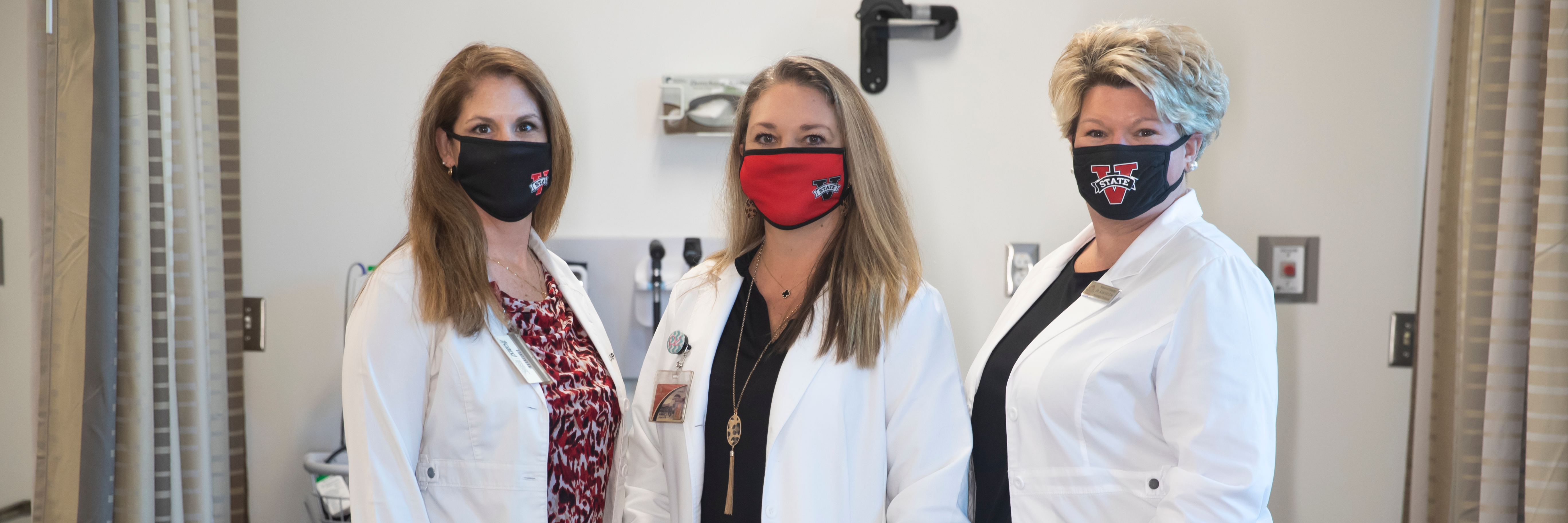Doctor of Nursing Practice
Announcement of CCEN Accreditation Visit, March 6-7, 2023
Valdosta State University’s (VSU) Doctor of Nursing Practice (DNP) Program will host an accreditation visit by the Commission on Collegiate Nursing Education (CCNE) March 6-7, 2023. This visit aims to seek CCNE accreditation for the following Doctor of Nursing Practice (DNP) tracks: BSN-DNP, Family Nurse Practitioner concentration, and Post-Master's DNP.
As required by the CCNE procedures, at least two months before the scheduled evaluation, VSU must notify its constituents, including, at a minimum, faculty teaching and students enrolled in the program(s) under review, that an accreditation review is scheduled. CCNE will receive third-party comments until January 23, 2023.
In accordance with CCNE’s procedures, the Commission provides the opportunity for program constituents and other interested parties to submit, in writing, third-party comments concerning a program’s qualifications for accreditation. All third-party comments submitted to CCNE must be written in English, consistent with CCNE's policy on Conduct of Business in English.
Direct all comments to thirdpartycomments@ccneaccreditation.org.
CCNE shares third-party comments with members of the evaluation team prior to the visit, but at no time during the review process are these comments shared with the program. During its review of the program, the evaluation team considers third-party comments related to the accreditation standards.
About
In many institutions, advanced practice registered nurses (APRNs), including Nurse Practitioners, Clinical Nurse Specialists, Certified Nurse-Midwives, and Certified Registered Nurse Anesthetists, are prepared in master's-degree programs that often carry a credit load equivalent to doctoral degrees in the other health professions. The American Association of Colleges of Nursing (AACN) position statement calls for educating APRNs and other nurses seeking top leadership/organizational roles in Doctor of Nursing Practice (DNP) programs. DNP curricula build on traditional master's programs by providing content in evidence-based practice, quality improvement, and systems leadership, among other key areas. The DNP is designed for nurses seeking a terminal degree in nursing practice and offers an alternative to research-focused doctoral programs. DNP-prepared nurses are well-equipped to fully implement the science developed by nurse researchers prepared in PhD, DNS, and other research-focused nursing doctorates. At VSU, the DNP program will be offer as a BSN-DNP program and as a Post-Master’s DNP. At this time the BSN-DNP program is only for Family Nurse Practitioners. The Post-Master’s DNP is open to all APRNs.
The BSN-DNP Program
The BSN-to-DNP program offered at VSU is a 10-semester, 81 credit hour program of study that is a pathway for students who have completed their Bachelor of Science in Nursing degree and desire to complete their MSN and DNP degrees. The program offers a seamless transition to obtaining both the FNP and the DNP. It also offers an MSN opt-out option at Semester 7 with the ability to return within 3 years to complete the last 3 semesters for attainment of the DNP. The DNP graduate is prepared and equipped for advanced nursing practice and leadership in an increasingly complex health system.
Post-Master's DNP Program
The Post-Master's Doctor of Nursing Practice (DNP) program offered at VSU is a 5-semester, 38 credit hour program of study. The DNP program prepares graduate Advanced Practice Registered Nurses (APRNs) for leadership roles in an increasingly complex healthcare system as well as for utilizing evidence-based practice to design, implement, and evaluate change for improved health outcomes. With its online format, the Post-Master's DNP option allows the working APRN the flexibility to learn while working.
Post-Master’s DNP Program Admission Information
Why Move to the DNP?
The changing demands of this nation's complex healthcare environment require the highest level of scientific knowledge and practice expertise to assure quality patient outcomes. The Institute of Medicine, Joint Commission, Robert Wood Johnson Foundation, and other authorities have called for reconceptualizing educational programs that prepare today’s health professionals. Some of the many factors building momentum for change in nursing education at the graduate level include: the rapid expansion of knowledge underlying practice; increased complexity of patient care; national concerns about the quality of care and patient safety; 2 shortages of nursing personnel which demands a higher level of preparation for leaders who can design and assess care; shortages of doctorally-prepared nursing faculty; and increasing educational expectations for the preparation of other members of the healthcare team. In a 2005 report titled Advancing the Nation's Health Needs: NIH Research Training Programs, the National Academy of Sciences called for nursing to develop a non-research clinical doctorate to prepare expert practitioners who can also serve as clinical faculty. AACN's work to advance the DNP is consistent with this call to action.
The Doctor of Nursing Practice Degree: Entry to Nurse Practitioner Practice by 2025
On April 20, 2018, the National Organization of Nurse Practitioner Faculties (NONPF) made the commitment to move all entry-level nurse practitioner (NP) education to the DNP degree by 2025. Today, there are more than 300 DNP programs throughout the United States (US) (AACN, 2018), and NONPF has led the evolution of NP educational preparation to the DNP degree level (NONPF, 2015). NONPF maintains its dedication to all currently credentialed NPs and faculty members; however, we recognize that as the health care delivery system has grown increasingly complex, the role of NPs has evolved. The DNP degree reflects the rigorous education that NPs receive to lead and deliver quality health care. NONPF supports a seamless, integrated DNP curriculum without a master’s exit point as preparation for entry to the NP role (NONPF, 2015; NONPF, 2016). The DNP NP curriculum is not an add-on to the master’s curriculum; instead, the curriculum integrates objectives and learning opportunities for students to achieve the NP core and population-focused competencies that are written for doctoral level education (NONPF, 2013; NONPF, 2017a; NONPF and AACN, 2016). There are currently 187 post-baccalaureate DNP NP programs in the US, a 24% increase since 2015 (AACN, 2018). NONPF is committed to providing resources and support for faculty members as they embrace curricular changes (NONPF 2016). Moving all entry-level NP education to the DNP degree by 2025 will take commitment from multiple stakeholders and development of strategies and initiatives yet to be determined. In December 2017, NONPF hosted a DNP summit with stakeholders from nearly 20 national organizations to have a critical dialogue about moving entry-level NP education to the DNP degree by 2025 (NONPF, 2017b). While not all participants agreed that the DNP should be the entry level degree for NP practice, everyone agreed to continue the dialogue, stay actively engaged, and take the information back to their organizations. Moving forward, NONPF will continue to work with the DNP Summit participants and additional organizations and stakeholders, as they are critically important to realizing our goal. As the preeminent leader in NP education that provides timely and critical resources for NP educators, NONPF moves forward with an unwavering commitment to create innovative, high quality educational resources to NP faculty during this transition. Our work will lead and unite NP educators to transform healthcare.
Thank you for considering Valdosta State University and the College of Nursing and Health Sciences Doctor of Nursing Practice Program. The application process will open soon, please stay tuned. Any questions, please contact Dr. Knicole Lee, DNP program coordinator at knlee@valdosta.edu.
*Information retrieved from the American Association of Colleges of Nursing and the National Organization of Nurse Practitioner Faculties.
College of Nursing and Health Sciences
-
Health Sciences and Business Administration Building
2525 N. Patterson St.
Valdosta, Georgia 31698 -
Mailing Address
1500 N. Patterson St.
Valdosta, GA 31698 - Phone: 229.333.5959
- Fax: 229.333.7300
- Monday-Thursday
8:00 a.m.-5:30 p.m.
Friday
8:00 a.m.-3:00 p.m.


